How Germany is leading Europe’s organic food revolution
The EU has been working since 2014 on new regulations for a sector that is on the rise across the world

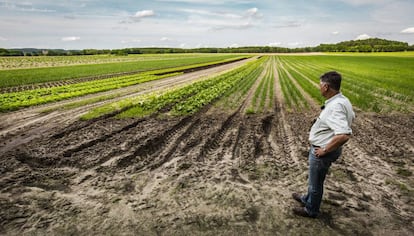
What is the difference between an organic and a conventional egg? At first sight, none at all. What changes is the process prior to the egg going on sale: no synthetic pesticides, no farms packed with animals, no intensive growing. “It’s more sustainable,” concludes Joyce Moewius of BÖLW, the umbrella organisation of the eco-food industry in Germany, the leading organic market in Europe, ranking second in the world just behind the United States. The EU has been working since 2014 on new regulations for a sector that grew by more than 7% in 2015, and is worth €75 billion globally. Lack of consensus regarding some issues, in particular pesticide levels, unleashed war in Brussels and, as a result, the regulations were among the most disputed in the history of the EU’s agricultural policy.
The issue is not the product but the process. “The regulations state how products are produced, labeled and controled,” says Moewius. European organic farmers are prohibited from using synthetic pesticides (but they have permission to use some phytosanitary products) and from supplying antibiotics to animals, which must receive natural sunlight and roam freely in the open. “Greater biodiversity and variety of crops are assured,” says Anna Maria Häring, Professor of Agricultural Food Industry Policies and Markets at Eberswalde University in Germany, adding: “animals are prevented from becoming resistant to bacteria, which would not be good for their health or that of humans.”
I buy organic every two days. We are using too many chemicals , and this is my little grain of sand Daniel, a customer at German wholefood store AlNatura
To earn organic certification, producers must not use any type of fertilisers for three years, although the seal of approval is granted, even if the end product has traces of chemical substances that are prohibited for these types of foods. But, of course, certain thresholds cannot be passed, exactly the same as with conventional foods. “The problem is that contamination may come from anywhere,” says Isabelle Buscke, the head in Brussels of the Federation of German Consumer Organisations (known by its German acronym, VZBV). “If your neighbour is a traditional farmer, you cannot stop the wind from taking the pesticides he uses to your ecological crops.”
A decade ago, Ludolf Von Maztlan took the helm at Brodowin, an organic farm spread over 1,000 hectares between Berlin and the Polish border. “It is profitable, but you need to invest a lot of time and money,” he says. With 1,600 hens, 220 cows and 300 milk-producing goats, he has his own brand that supplies local stores, as well as through its farm shop.
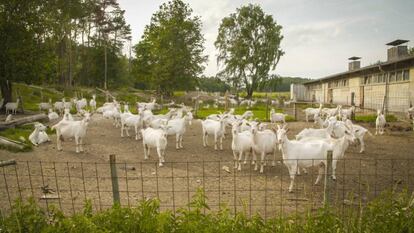
A small shop filled with organic products from the farm is a mandatory stop prior to visiting the stables. “Our animals go out to graze in the fields every day,” says Von Maztlan, proudly displaying his livestock. A few minutes away by car along a dirt path are fields overflowing with onions, potatoes, different types of cauliflower and pumpkins. “One of the major nutrients for plants is nitrogen,” the farmer said, “a substance that improves the yield of the crops and becomes fixed thanks to the bacteria living in the roots of leguminous crops.”
Eco-farming has garnered support among consumers at a time of increasing concern for wellbeing, health and the environment. Both in Germany and in other European countries, there are growing numbers of specialist shops, while organic foods have flooded into supermarkets selling traditional foodstuffs. But price remains one of the major barriers for consumers. “Organic products are usually between 30% and 50% more expensive,” Von Maztlan says, but “many people are willing to pay the price for it.” “It’s not a matter of its being healthier, because nutrition today, whether organic or conventional, is fantastic. What matters is the fact that it is less harmful for nature.”
One of the organic markets that grew the most in 2015 was Spain, hiking by over 20%
While Von Maztlan voices his reasons, a legislative war is underway in Brussels over new regulations for organic production. Following the dioxin scandal of 2010, when the German market was flooded with contaminated eggs, the European Commission launched a public enquiry, and in 2014 decided to regulate the sector. After years of tough negotiations, in early July a timid political agreement was reached between the Commission, the Parliament and the Council, prior to the final vote, which is pending.
“Negotiations were tough from the start,” says Norber Lins, a European MP with the Popular Group. He explained that the most controversial issue was the Commission’s suggestion that only foods entirely free from traces of pesticides (less than 0.01 mg per kg, the same as for baby foods) could be certified as organic. “There was a very heated discussion,” says Lidia Senra, a Spanish European MP from the ranks of the European United Left. The proposal, which was finally not included in the text, led to opposing views,” she said. “We agreed with the Commission and proposed that, in the event of involuntary contamination, an organic producer should be compensated, but the amendment was not passed.”
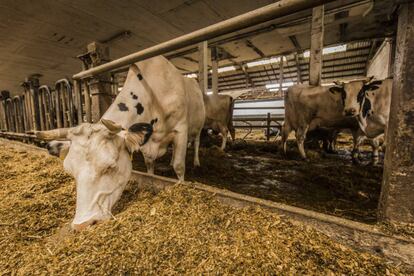
Eduardo Cuoco, director of the International Federation of Organic Agriculture Movements (IFOAM), says: “what is considered biological comes from a certificate of the process, not of the product. In the last 15 days, we have worked intensively to reach an agreement, and the way to solve the problem is by not solving it.”
A niche business
In Berlin, it is easy to find open-air organic flea markets and shops that only sell certified products. There is even a “bio hotel” on the east side of town. Almodóvar Hotel, named in tribute to the Spanish film director, is located in the alternative neighbourhood of Friedrichshain. It has tables of solid wood from India and oriental-style furniture along with a daily menu, written with chalk on a blackboard, ensures that the food is 100% organic. “We visited a number of banks before finally getting a loan; they said we were mad,” said the owner, Alexandra Müller-Benz, who inaugurated her project in 2012. “Today we have clients from all over the world, although there are people who make their reservations unaware of the fact that everything is sustainable, including the paint and the floors,” she adds.
To earn organic certification, producers must not use any type of fertilisers for three years
Although it is still a niche business, ecological crops have grown at a pace of 500,000 hectares a year in Europe in the last decade, according to Eurostat, and in 2015 they accounted for 6.2% of farmlands. “The goal is to reach 50% by 2030,” Cuoco says
Kirsten Arp, quality manager at BNN (German association of organic food processors, wholesalers and retailers), says that Germany already has shops specialising in organic foods at the end of the 1970s, though in the absence of European regulations providing a legal framework for the industry. The first EC regulations were passed in 1991 and in 2010 the organic leaf label was introduced, a seal certifying that the process meets the standards. “We were pioneers,” Arp says. “Today we have around 2,500 shops, and sales of organic products represent 5% of the whole food sector.”
Thanks to its demographic muscle and the political support it receives, especially from the Green Party, Germany is the undisputed leader in terms of the size of the market -in 2015 it grew by 10% with a turnover of €8.5 billion, nearly one third of the European market (€30 billion) - but climate conditions do not allow Germany to lead the production classifications. “We import from southern Europe and other countries,” Arp says.
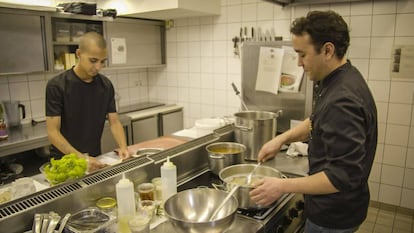
María Dolores Raigón, a lecturer at the Polytechnic University in Valencia and president of the Spanish Society for Organic Farming, says "there are two Europes with different goals: northern Europe is a consumer and southern Europe, a producer.” “But things are changing,” she said. According to statistics from the Research Institute for Organic Farming, FIBL, one of the markets that grew the most in 2015 was Spain, hiking by over 20%.
One of the major criticisms of organic farming is that yields are lower compared to traditional methods, because more land is needed as intensive production methods are not used. “But there are studies to the contrary,” Häring, from Eberswalde University, says. “We need to continue with our research and change consumer patterns if we are to foster this type of farming,” he suggests.
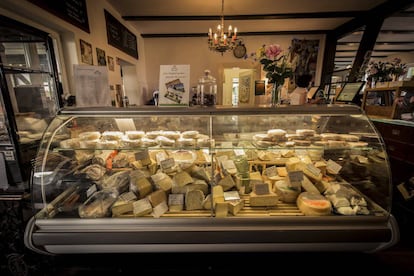
“I buy organic every two days,” says Daniel, a young designer from Hamburg at the AlNatura store in Berlin, which is one of the largest specialist chains in Germany. “I feel like we are using too many chemical products, and this is my little grain of sand.”
“Consumers trust the seal, but they don’t always know what organic means,” Buscke adds, “and labels aren’t always helpful.” Aside from the European seal, several countries such as Germany have their own certifications, each with its own label. “Work needs to be done here to avoid confusion,” Buscke says. “The most important thing is for consumers to know what they are buying.”
Translation by News Clips.